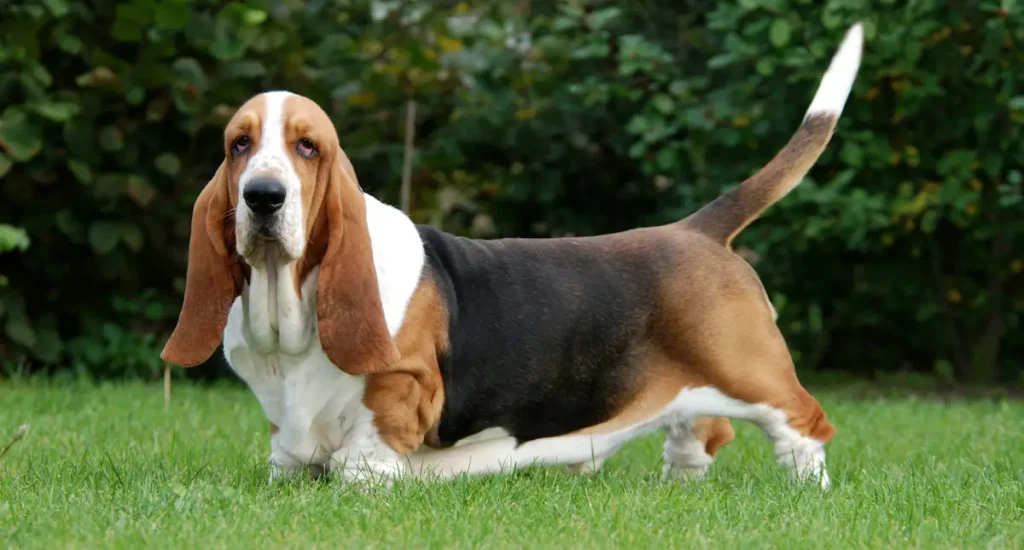Steady in their gait, serene in their demeanor, and singular in their loyalty, Basset Hounds hold a special place in the hearts of those who cherish a dog with a calm temperament and an endearing personality. As you consider the addition of a new furry member to your family, you might find yourself drawn to this breed’s distinctive appearance and amiable nature.
Known for their patience and affinity for companionship, Basset Hounds prove to be more than just their melancholic expressions and strolls. They bring a harmonious balance to a bustling household, patiently enduring the lively antics of children, while also providing a comforting presence for adults.
But before you’re swept away by their charm, it’s crucial to understand the nuances of their care, their exercise needs, and the ways to navigate their sometimes stubborn streak. In the journey to learn whether a Basset Hound aligns with your family’s lifestyle, you’ll uncover the layers of their personality and the commitments required to ensure their well-being.
- Noise Level
- Energy
- Sociability
- Trainability
- Care
- Health
Overall
Summary
The Basset Hound is known for being moderately noisy, moderately energetic, highly sociable, moderately trainable, requiring moderate care, and generally having good health.
Basset Hound: Traits, Temperament, and Care Guide
As you explore the Basset Hound’s traits, you’ll find they possess a distinct appearance characterized by droopy ears, a short-legged stature, and a melancholic expression.
Their temperament is typically calm and friendly, making them ideal for households seeking a non-aggressive pet.
You’ll need to focus on their care requirements, which include managing their weight through measured exercise and maintaining their coat with regular grooming.
Understanding the Unique Characteristics of Basset Hound
Delving into the traits and temperament of Basset Hounds, you’ll find they’re a breed characterized by their calm demeanor and friendliness, necessitating consistent care routines for optimal health and happiness.
Recognized by long ears and loose skin around their face, Basset Hounds are prone to ear infections, requiring vigilant maintenance.
As a scent hound with a keen sense of smell, they were historically valued as hunting companions. Their droopy ears enhance their tracking ability.
Exploring the Characteristics of the Basset Hound
With their distinctive long, droopy ears and wrinkled foreheads, Basset Hounds offer a unique combination of a patient temperament and a powerful tracking ability. Bred in France, these medium-sized hounds require regular grooming and moderate exercise to maintain their health.
| Trait | Detail |
|---|---|
| Coat | Short, requires weekly care |
| Exercise Needs | Daily walks or hikes |
| Socialization | Early is crucial |
| Ideal For | Family dogs |
As family dogs, early socialization ensures their friendly temperament shines through from puppyhood.
Basset Hound: A Comprehensive Profile and Guide
As you consider welcoming a Basset Hound into your life, it’s crucial to understand their specific needs and characteristics.
This breed requires a balance of affection and discipline, thriving in environments that provide regular exercise and mental stimulation.
You’ll find that their patient nature and adaptability to various living situations make them an ideal candidate for both novice and experienced dog owners.
Everything You Need to Know About the Basset Hound
Are you considering bringing a Basset Hound into your home? Here’s a comprehensive guide to help you understand everything about this unique and lovable breed.
- Breed Profile: The American Kennel Club (AKC) recognizes Basset Hounds for their long ears and gentle demeanor, making them a good fit for families.
- Family-Friendly Temperament: Known for being patient with young children, they embody a family-friendly temperament.
- Choosing Reputable Breeders: Always select reputable breeders to ensure a healthy and well-adjusted companion.

Discovering the Temperament of Basset Hound
Many Basset Hounds possess a calm and amiable temperament, making them ideal pets for families seeking a gentle and sociable companion. With their short legs and long ears, they embody a family-friendly temperament.
Basset Hounds are good with children, showcasing a gentle disposition that’s even-tempered and durable. Though sociable, they can be stubborn; consistent training ensures they integrate well into family life.
Basset Hound: Is It a Good Fit for Families?
When considering a Basset Hound for your family, you’ll find their temperament well-suited for life with young children.
They need consistent exercise and aren’t adept swimmers, yet their playful nature makes them engaging companions for kids.
It’s essential to prioritize early socialization and training to ensure a Basset Hound integrates smoothly into your family dynamics.
Assessing Basset Hound’s Compatibility with Families and Kids
Considering a Basset Hound as a family pet, it’s essential to recognize their gentle demeanor and patience, which often make them compatible companions for children.
- Temperament: Basset Hounds possess a family-friendly temperament, characterized by a calm and amiable nature.
- Gentleness: Their gentle approach is particularly suited for interactions with children.
- Patience: A patient breed, Basset Hounds typically tolerate the energetic and unpredictable behavior of kids well.
Basset Hound Apartment Suitability
Basset Hounds, with their moderate exercise requirements and easygoing temperament, are well-suited to apartment living as long as they’re provided with daily walks and mental stimulation. They require regular exercise and respond well to interactive toys, ensuring their apartment suitability. Make sure to prevent weight gain and combat their couch potato tendencies through short, engaging activities. A daily walk is essential to keep them happy and healthy.
Basset Hound Obedience Tips
As you begin training your Basset Hound, it’s crucial to understand their unique learning style. Consistent, positive reinforcement techniques are most effective, as this breed responds well to rewards rather than punishment.
Establish a routine early on and be patient; Basset Hounds may require more repetition to master commands due to their independent nature.
Effective Training Strategies
To effectively train your Basset Hound, it’s essential to understand that this breed responds best to consistent, patient, and positive reinforcement techniques. Your training sessions should capitalize on their natural smell and tracking abilities. Remember, time and patience are key to success with these breeds.
| Consistency | Patience | Positive Reinforcement |
|---|---|---|
| Key to obedience | Necessary for progress | Encourages good behavior |
| Reinforces habits | Fosters trust | Builds a bond |
| Essential for Basset Hounds | Integral for training | Makes training enjoyable |
Long walks are also great for reinforcing commands and bonding.
Basset Hound Exercise and Grooming Needs
Ensuring your Basset Hound receives daily moderate exercise, such as leisurely walks and playful activities, is essential for their well-being. Walks are a great way to keep your dog’s long ears and loose hair clean, and consistent play sessions help mitigate risks of hip dysplasia.
In addition to exercise, a grooming routine that includes regular brushing and ear care is crucial for your Basset Hound. Regular brushing helps to prevent matting and keeps their coat healthy and shiny. Pay special attention to their long ears, as they are prone to infections. Cleaning them regularly will help prevent any issues.
Lastly, don’t forget to have your Basset Hound’s teeth brushed regularly. Dental hygiene is important for their overall health and can help prevent dental diseases.
Taking these steps will ensure that your Basset Hound is happy, healthy, and well-cared for.

Health Considerations for Basset Hound
As you consider a Basset Hound’s health, it’s crucial to recognize their propensity for obesity; moderate their diet and ensure they get enough exercise.
You must be vigilant for signs of common conditions such as gastric dilatation-volvulus and hip dysplasia, and maintain a routine of preventive screenings.
To prolong their average lifespan of 12-13 years, implement consistent grooming practices that include elevated feeding stations to safeguard their long ears from infections.
Alternatives for Basset Hound: Laid-Back and Scent-Oriented Dogs
Explore these breeds if you appreciate the Basset Hound’s laid-back demeanor and scent-oriented skills, ideal for those who value a relaxed and keen-nosed companion.
| Similar Dogs | Short Description |
|---|---|
| Bloodhound | Renowned for its exceptional tracking ability and gentle nature. |
| Beagle | A small hound known for its incredible sense of smell and friendly temperament. |
| Coonhound | Known for their tracking skills and vocal nature, suitable for hunting and companionship. |
| Dachshund | A breed with a unique body shape, known for its hunting and tracking skills. |
| American Foxhound | Known for its speed, stamina, and excellent scenting ability. |
Common Health Issues and Lifespan
When considering the health of Basset Hounds, it’s important to note that they’re prone to obesity, which can lead to other significant health problems if not managed properly.
These dogs often battle joint issues like hip and elbow dysplasia due to their genetic makeup.
Their long ears require vigilant care to prevent infections.
Recognized for their gentle nature among large breeds, Basset Hounds typically enjoy a life expectancy of 12-13 years.
Conclusion
You’ve delved into the soulful eyes of the Basset Hound, a breed both noble and comical in stature. In their slow saunter lies a keen vigor, contrasting with their apparent lethargy.
These hounds, your potential devoted companions, demand your patience in training yet reward with undying loyalty. While they thrive on affection, remember their health needs vigilance.
In choosing a Basset, you embrace a bittersweet symphony of care, companionship, and the joy of life’s simple pleasures.
Is the Right Pet for You?
Considering a Basset Hound as your next pet can be a wise choice if you’re seeking a gentle and low-energy companion to join your family. With a family-friendly temperament, Bassets are endearing to all family members.
Originally used for hunting due to their keen sense of smell, they’re adaptable to home life. Seek potential pups from rescue groups to bring home a loving, floppy-eared friend.
Frequently Asked Questions
Are Basset Hounds Family Friendly?
Yes, Basset Hounds are family-friendly. They’re loyal companions with a mild temperament and an easygoing nature, making them a kid-friendly breed. Be mindful of their low energy and stubborn streak during training challenges.
What Is the Downside to Having as Basset Hound?
Owning a Basset Hound’s like tackling a fluffy challenge; their stubborn nature, health concerns, and grooming needs demand your attention. They’ll serenade you with loud howling, while their exercise and odor require management.
Are Basset Hounds Gentle Dogs?
Yes, you’ll find Basset Hounds are gentle dogs, featuring an easy-going nature and patient demeanor. These amiable companions are loyal pets, despite their stubborn streak and training challenges due to low energy and scent-driven behavior.
Are Basset Hounds Good Moms?
Basset Hounds possess strong maternal instincts, ensuring excellent litter care. They’re protective, forming deep mother-pup bonds. Their nursing behavior and canine nurturing are innate, enhanced by maternal training for whelping readiness. You’ll be impressed.
